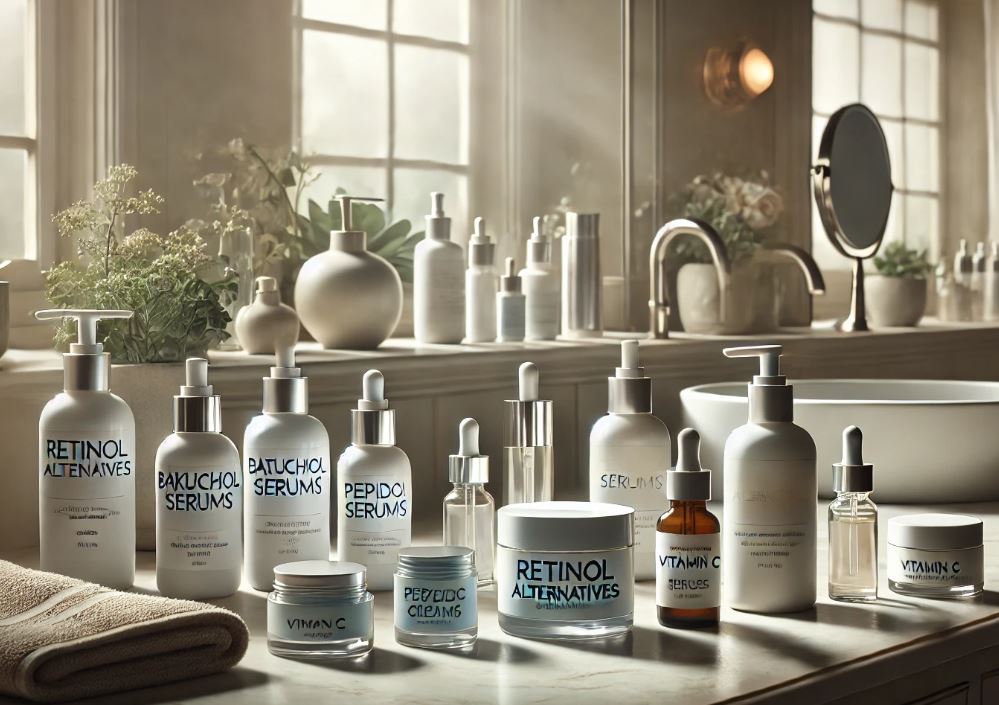I'm a participant in the Amazon Services LLC Associates Program, an affiliate advertising program designed to provide a means for me to earn fees by linking to Amazon.com and affiliated sites.
Retinol is a popular skincare ingredient renowned for its anti-aging and skin-smoothing benefits. However, it is not suitable for everyone. Understanding who should avoid retinol can help prevent adverse reactions and ensure that your skincare routine is both safe and effective. In this article, we will explore the groups of people who should steer clear of retinol, alternatives to consider, and expert opinions on the matter.
Need help finding the right skincare product? Most people will benefit from retinol. Our guide on the best retinol for sensitive skin will give you the assistance you need.
Key Takeaways
- Pregnant and breastfeeding women should avoid retinol due to potential risks to the baby.
- Individuals with certain skin conditions, such as eczema and rosacea, might experience exacerbation of their symptoms with retinol use.
- Alternatives like bakuchiol and peptides can provide similar benefits without the associated risks of retinol.
Who Should Avoid Retinol?
Pregnant and Breastfeeding Women
Pregnant and breastfeeding women are often advised to avoid retinol. This is because retinoids, the class of compounds to which retinol belongs, have been linked to birth defects when used in high doses. Although the amount absorbed through topical application is significantly lower than oral intake, the potential risk is enough to warrant caution. It is better to err on the side of safety and opt for alternatives like vitamin C or bakuchiol during this period.
People with Sensitive Skin
Individuals with sensitive skin might find retinol too harsh. Retinol can cause irritation, redness, and peeling, particularly during the initial stages of use. Those with conditions like eczema or rosacea are especially prone to these side effects, which can exacerbate their symptoms. It’s essential to consult with a dermatologist before introducing retinol into your skincare routine if you have sensitive skin.
Individuals with Extensive Sun Exposure
Retinol increases the skin’s sensitivity to sunlight, making it more susceptible to sunburn and damage. If you spend a lot of time outdoors or live in a sunny climate, using retinol can pose a risk to your skin’s health. Always use a broad-spectrum sunscreen when using retinol, and consider reducing its use during periods of high sun exposure.
Alternatives to Retinol
Bakuchiol
Bakuchiol is a plant-based alternative to retinol that offers similar benefits without the associated irritation. It helps to reduce fine lines and improve skin texture, making it a suitable option for those who cannot tolerate retinol. Bakuchiol is gentle on the skin and is safe for use during pregnancy and breastfeeding.
Peptides
Peptides are another excellent alternative to retinol. They work by promoting collagen production, which helps to reduce the appearance of wrinkles and improve skin elasticity. Peptides are generally well-tolerated and can be used by individuals with sensitive skin or those who spend a lot of time in the sun.
Vitamin C
Vitamin C is a powerful antioxidant that helps to brighten the skin, reduce pigmentation, and boost collagen production. It is a suitable alternative for those who cannot use retinol and can be incorporated into both morning and evening skincare routines.
Recent Developments in the Field
As of July 2024, advancements in skincare formulations have led to the development of more retinol alternatives that provide similar benefits with reduced risks. Research continues to explore the efficacy of these alternatives, such as new formulations of bakuchiol and peptides, to offer consumers safer and more effective options (InStyle).
Moreover, the skincare industry is focusing on creating products that cater to sensitive skin, ensuring that individuals who cannot tolerate retinol still have access to effective anti-aging solutions.
Top Experts and Entities in the Field
Leading dermatologists like Dr. Whitney Bowe and Dr. Shereene Idriss provide valuable insights into the safe use of retinol and its alternatives. These experts emphasize the importance of personalized skincare routines tailored to individual skin types and concerns.
Organizations such as the American Academy of Dermatology (AAD) offer guidelines on the use of retinoids and their alternatives, helping consumers make informed decisions about their skincare products.
Internal Links for Further Reading
For more insights and comparisons, check out these articles:
- Sunday Riley vs Drunk Elephant: Luxury Skin Care
- SkinCeuticals vs SkinBetter Science
- Best Makeup Remover for Sensitive Skin
- How to Remove Makeup
- How Can I Remove Makeup Without Makeup Remover?
These resources provide valuable information and comparisons to help you make informed decisions about your skincare routine.
Conclusion
While retinol is a highly effective skincare ingredient, it is not suitable for everyone. Pregnant and breastfeeding women, individuals with sensitive skin, and those with extensive sun exposure should consider alternatives like bakuchiol, peptides, and vitamin C. By understanding who should avoid retinol and exploring safer options, you can maintain a healthy and effective skincare routine.
Author
Luxury Shimmer has been a trusted name in the skincare industry for years, offering expert insights and in-depth reviews to help consumers make informed decisions. Our commitment to quality and expertise ensures that you receive the best advice for your skincare needs.
